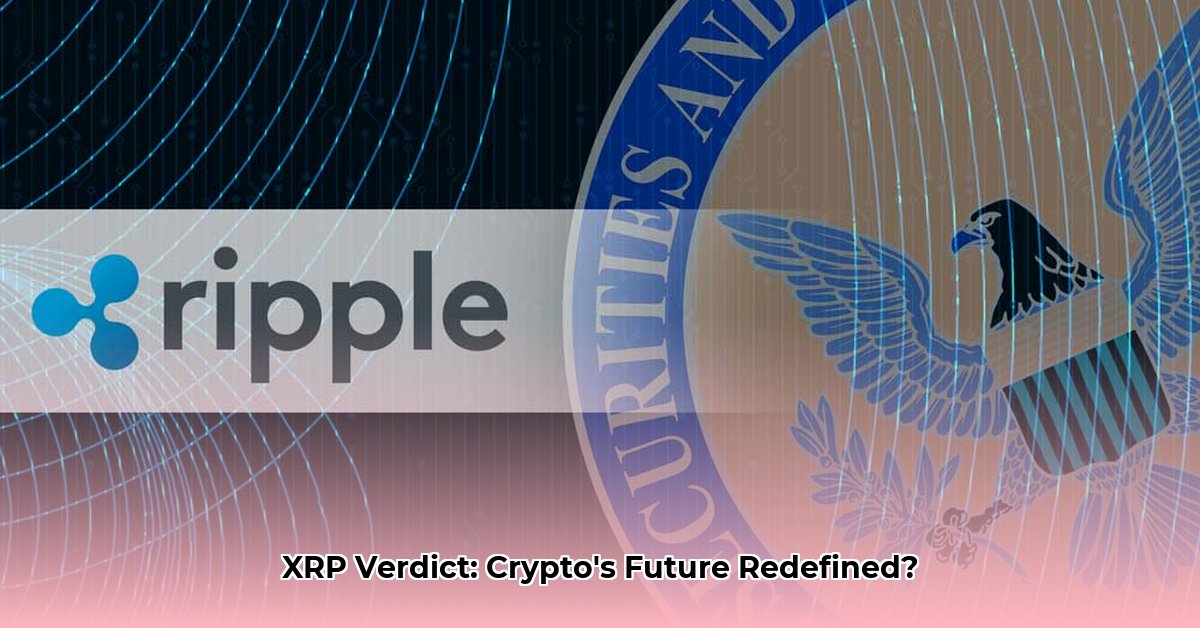
The Verdict: A Partial Victory, Lingering Uncertainty
The Ripple-SEC lawsuit concluded with a decision that's less a definitive resolution and more a pivotal turning point. Judge Analisa Torres ruled that programmatic sales of XRP on public exchanges did not constitute the unregistered sale of securities. This represents a partial victory for Ripple. However, the ruling deemed direct sales of XRP to institutional investors were unregistered securities offerings. This nuanced decision highlights the critical importance of how cryptocurrencies are distributed and marketed, significantly impacting future token sales strategies. The SEC's subsequent appeal introduces further uncertainty, prolonging the legal battle and its impact on the cryptocurrency market.
What does this mean for XRP, and how will this landmark ruling shape future crypto regulation?
Key Takeaways:
- The court's decision offers a partial win for Ripple, declaring some XRP sales were not securities while others were.
- This ruling underscores the critical importance of sales methods and marketing strategies in determining securities classification.
- The SEC's appeal creates widespread uncertainty within the cryptocurrency industry, influencing investor confidence and market stability.
Decoding the Decision: Implications for Crypto Sales & Regulation
The court's ruling hinges on a fine distinction between public and private sales of XRP. The finding that over-the-counter (OTC) sales to institutional investors constituted unregistered securities necessitates a thorough reassessment of how cryptocurrency companies structure their token sales, particularly concerning direct sales to accredited and institutional investors. The ruling's implication for public sales, however, suggests that projects distributing tokens via open exchanges may have a more defensible position regarding securities classification. This creates a complex regulatory landscape and potentially sets a precedent for future cases. How will this impact the future fundraising strategies of blockchain projects? The answer shapes the trajectory of the entire cryptocurrency ecosystem.
The SEC's Appeal: Prolonged Uncertainty & Market Volatility
The SEC's appeal significantly prolongs the legal uncertainty surrounding XRP and casts a shadow over the broader cryptocurrency market. This drawn-out process fuels market volatility and inhibits investor confidence. Will the appeal significantly alter the initial ruling? The answer holds substantial ramifications for XRP's price and the overall stability of the cryptocurrency market. The extended legal process will inevitably influence investor decisions and the broader market climate. The decision may affect the price of XRP in the short-term because of the uncertainty. It will also create a ripple effect which can be seen in other cryptocurrencies and companies.
Ripple's Strategy: Navigating Legal Challenges & Shifting Regulatory Landscapes
Ripple faces the challenge of mitigating the negative impact of the appeal while also advocating for regulatory clarity. Their strategy must balance fighting the appeal with proactive efforts to shape a more favourable regulatory environment within the United States. Will their strategy involve adjustments to how they have conducted their sales in the future, or something else entirely? The answer depends on the various elements and factors within the matter. Their long-term viability depends on their ability to both weather this legal storm and contribute positively to the ongoing crypto regulatory debate.
The Broader Cryptocurrency Landscape: A Pivotal Precedent
The Ripple-SEC case is not simply about one company or one cryptocurrency. The outcome will influence the regulatory approaches taken towards other cryptocurrencies, influencing how projects structure their token sales and fundraising efforts. How will other projects adapt their strategies in response to the ambiguities in the ruling? The case has already prompted many cryptocurrency exchanges to review their listing policies and compliance measures. This case underscores how intertwined legal and financial realms are with the development of technology.
Stakeholder Impacts: Short-Term and Long-Term Consequences
The Ripple-SEC case's impact extends far beyond Ripple itself, affecting various stakeholders in the crypto space:
| Stakeholder | Short-Term Impact (0-1 year) | Long-Term Impact (3-5 years) |
|---|---|---|
| Ripple Labs | Navigating the appeal, adjusting strategies, managing uncertainty | Lobbying for regulatory clarity, adapting business models, potential strategic partnerships |
| SEC | Continuing the appeal, reviewing enforcement strategies | Developing more specific regulatory frameworks for crypto assets |
| Cryptocurrency Exchanges | Adjusting listing policies, strengthening compliance measures | Implementing more stringent compliance protocols, adapting to evolving regulations |
| Investors | Price volatility, cautious investment decisions, risk assessment | Greater regulatory clarity (hopefully) leading to more informed decisions |
| Crypto Businesses | Adapting to legal uncertainties, potentially altering business models | Enhanced compliance measures, increased international focus, innovation in regulatory compliance |
Looking Ahead: The Road to Regulatory Clarity
The Ripple-SEC case underscores the urgent need for clearer, more comprehensive regulations in the cryptocurrency space. The outcome of the appeal, alongside future regulatory actions, will greatly influence the development and adoption of cryptocurrencies in the United States and beyond. The path forward remains uncertain, but this case marks a crucial step in the ongoing dialogue about the regulatory landscape for digital assets, shaping the future of the cryptocurrency industry for years to come. The future will tell the true impact of this landmark case.